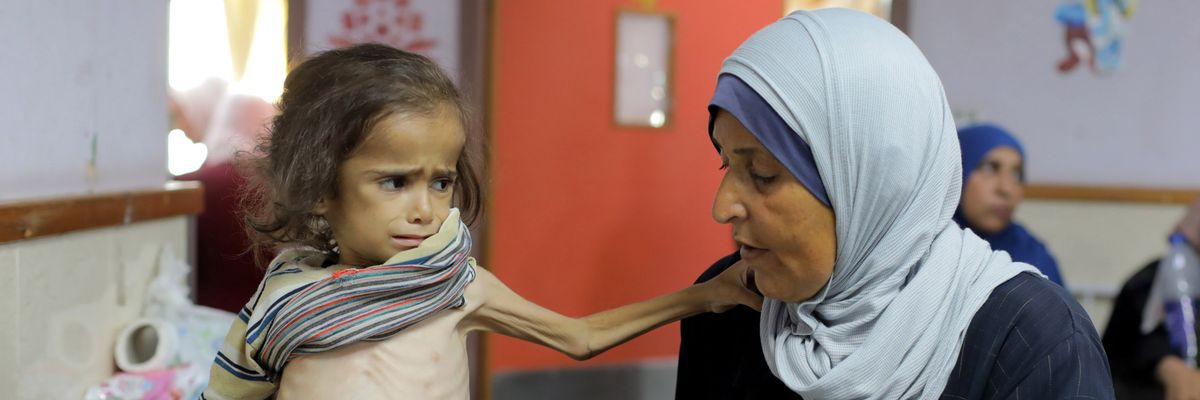Humanitarian officials at the United Nations warned Wednesday evening that with Israel continuing to block aid deliveries across Gaza, thousands of children are among those facing acute malnutrition as extreme summer heat exacerbates suffering in the besieged enclave.
The Site Management Working Group for the U.N. Office for the Coordination of Humanitarian Affairs (OCHA) released its latest report on the humanitarian situation in Gaza, noting that aid deliveries in recent days have done little to improve the condition of a population that has been under attack by the U.S.-backed Israeli military—and facing an illegal blockade—for more than eight months.
OCHA said its workers have seen "visible signs of wasting among children"—the most dangerous form of malnutrition, which causes a child to be too thin for their height and results from rapid weight loss.
"No nutrition screenings have been conducted to assess the scale of malnutrition and treat identified cases due to limited capacity," reported OCHA.
Last week, the World Health Organization reported that more than 8,000 children have been diagnosed with and treated for acute malnutrition, including 1,600 with severe wasting.
Health officials have counted at least 32 deaths from malnutrition in Gaza, including 28 among children under the age of five. At least 37,431 Palestinians have been reported killed in the enclave since October, but with hospitals, emergency services, and communications systems largely inoperable due to relentless attacks by the Israel Defense Forces (IDF), the official death tolls from starvation and other causes are likely significant undercounts.
OCHA reported that at displacement sites like Deir el-Balah, Khan Younis, and Al Mawasi, where hundreds of thousands of internally displaced people are "living in overcrowded makeshift shelters and tents" with no protection from extreme heat, medical facilities are operating for only a few hours per day and have shortages of medicines.
"Unaffordable transportation and the lack of ambulance services hamper access to partially functioning hospitals, with reports of emergency deliveries taking place in tents with no medical support at late hours during the night," the agency reported.
At Al Jazeera on Thursday, correspondent Hani Mahmoud provided a dispatch from Deir el-Balah, where reporters entered Al-Aqsa Hospital—the only remaining hospital with any functionality in central Gaza:
We spoke to medical staff who described the outbreak of diseases as "alien." The diseases are spreading among displaced people due to their poor living conditions, contaminated water, lack of sanitation and hygiene, and the rising heat. The Israeli military destroyed the vast majority of Gaza's sanitation facilities. It's easy to walk along any of the roads here and see sewage. This is all aggravating the spread of diseases, particularly infectious diseases among women, children, and those who have health complications. Inside Al-Aqsa Hospital, there is unanimous agreement that it is not a hospital any more. It's not suitable for medical services, it's not suitable to save lives.
Pediatric surgeon Jamal Mari, who has been working at one of Deir el-Balah's destroyed hospitals, Al-Ahli, on a medical aid mission from Australia, toldAl Jazeera he encountered a facility with "zero supplies," and was barred from bringing any of his own medical equipment to provide care.
"Whatever disposables we have, we keep reusing and reusing them, which is not safe at all," said Mari. "They've got five rooms which they say are operating theaters, but honestly they're just little cubicles re-fashioned and done as theaters... I don't understand how they're managing."
Deir el-Balah was the site of overnight Israeli air strikes on Thursday, as was the Nuseirat refuguee camp. At least three people were killed and more than a dozen were injured, while the IDF increased its attacks on the southern city of Rafah, where more than 900,000 people have already fled since Israel launched a full-scale attack in May.
The U.N. Relief and Works Agency for Palestine Refugees in the Near East (UNRWA) reported on Wednesday that since October 7, when the IDF began its bombardment of Gaza in retaliation for a Hamas-led attack on southern Israel, 67% of water sanitation facilities and infrastructure have been destroyed or damaged.
In addition to starvation, UNRWA said, "as infectious diseases continue to spread and temperatures rise, the lack of hygiene and dehydration pose a severe threat to the health of people across Gaza."
OCHA's report on Wednesday noted that "access constraints continue to severely undermine the delivery of essential humanitarian assistance and services across Gaza, including the delivery of food and nutrition assistance, medical care, protection and shelter support, and water, sanitation, and hygiene (WASH) services to hundreds of thousands of people."
Between June 1-18, Israeli authorities facilitated 46% of humanitarian assistance missions to northern Gaza. But more than half were either impeded, denied access, or canceled.
Planned transfers of hygiene kits, water deliveries, and waste removals were among the missions that were denied access, and dozens of humanitarian missions were also canceled and impeded in southern Gaza over the same time period.
Carl Skau, deputy executive director of the World Food Program, described the sabotage of the agency's aid efforts.
"Staff spend five to eight hours waiting at checkpoints every day," he said. "Missiles hit our premises, despite being deconflicted."
On social media, Palestinian journalist Bisan Owda posted a video on Wednesday saying that although some aid deliveries have been granted access by Israeli authorities in recent days, Palestinians are still "starving to death."
"Nothing changed," said Owda. "The Israeli army is still committing the same massacres using starvation in the north and the south, because simply, the air drops are not enough... They are trying to kill the people of Gaza by starvation."

